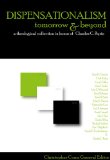Dispensationalism Tomorrow & Beyond: A Theological Collection in Honor of Charles C. Ryrie. Edited by Christopher Cone. Fort Worth, TX: Tyndale Seminary Press, 2008. 490 pp. Paper, $29.00.
As a classic Dispensationalist I am always pleased to see works from a truly Dispensational perspective. This is one such book.
The authors in this work are Dispensational scholars including Charles Ryrie, Robert Thomas, Arnold Fruchtenbaum, Paul Benware, Michael Stallard, and John Hart. All together there are chapters by 17 different authors, with several writing more than one chapter. Thus there are 23 chapters in all.
Seven of the chapters (1, 2, 6, 8, 9, 22, and 23) are reprints. While there is nothing wrong with using reprints, it is more normal either to have a book made up entirely of reprints (e.g., journal articles from a single journal) or one that merely has one or two. It struck me as odd that about one-third of this book is made up of reprints.
The structure of the book doesn’t seem to be well thought out. The 23 chapters are not subdivided into various Dispensational topics, though it would have been fairly easy to do so (e.g., Dispensational distinctives [chaps. 1, 2, 4, 7, 8, 11, 12, 13, 17, 18], Dispensation hermeneutics [chaps. 5, 6, 9, 10, 16], Dispensationalism and Daniel 9:24-27 [chaps. 14, 15], Dispensationalism and practical Christian living [chaps. 19, 20, 21, 22, 23]). The chapters do not flow in any sort of logical progression.
Even though the book seems merely to be a collection of articles thrown together without much planning, there is much helpful information here. I especially liked the chapters on the use of the OT in the NT by Robert Thomas (chap. 9), on the kingdom of emergent theology by Gary Gilley (chap. 20, including his rejection of a this-worldly kingdom and “salvation,” pp. 426-31), and the chapter on the importance of eschatology in Christian living by Paul Benware (chap. 23).
JOTGES readers will find this work to be basically friendly to Free Grace issues. Authors like Fruchtenbaum, Benware, Ryrie, and Hart are strongly Free Grace. However, Heslop writes about saving faith (chap. 11) and muddies the waters. He cites and rejects the view of Zane Hodges that one simply believes in Jesus for eternal life (p. 237). According to Heslop one must believe in God as Savior and also must believe in God Himself (p. 234). “The person of God has always been and will always be what must be believed in. The message or instrument whereby God presents Himself as the One to be believed in does change” (p. 235). Frankly, I do not understand what Heslop believes one must believe today, or what one had to believe in ages past, to be born again. He says clearly that the message has changed over time due to the progress of revelation (pp. 245-51), but it is hard to follow what the message was or is.
In a passing comment on his own testimony, John Whitcomb writes, “The Gospel message was graciously presented, and after several months of teaching, I surrendered to the claims and the authority of the Lord Jesus Christ” (p. 33). This sort of seemingly Lordship Salvation comment is not found in the other authors.
For the pastor or church leader who is especially interested in eschatology, this volume is worth reading and having.
Robert N. Wilkin Editor
Journal of the Grace Evangelical Society
Denton, Texas


